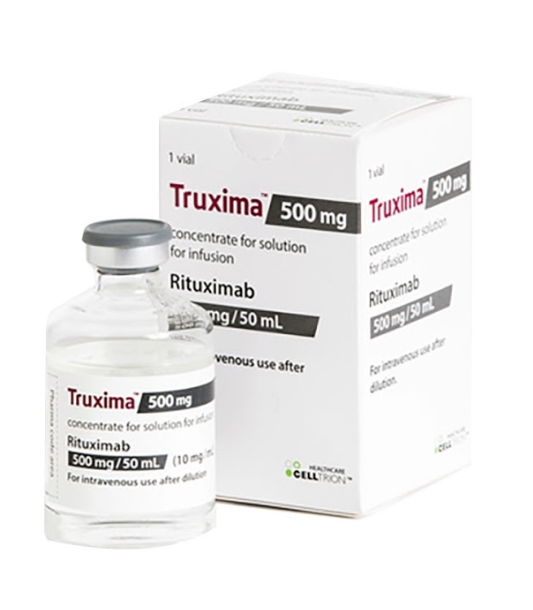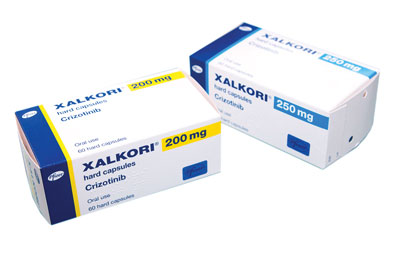Truxima (rituximab) vs Xalkori (crizotinib)
Truxima (rituximab) vs Xalkori (crizotinib)
Truxima (rituximab) is a monoclonal antibody used primarily to treat certain types of blood cancers, such as non-Hodgkin lymphoma and chronic lymphocytic leukemia, as well as autoimmune diseases like rheumatoid arthritis. Xalkori (crizotinib) is a small molecule tyrosine kinase inhibitor specifically indicated for the treatment of non-small cell lung cancer (NSCLC) with specific genetic alterations (ALK or ROS1-positive). The choice between Truxima and Xalkori would depend on the specific diagnosis and genetic characteristics of the cancer; a healthcare provider would recommend one over the other based on the type of cancer being treated and the presence of targetable genetic mutations.
Difference between Truxima and Xalkori
| Metric | Truxima (rituximab) | Xalkori (crizotinib) |
|---|---|---|
| Generic name | Rituximab | Crizotinib |
| Indications | Non-Hodgkin's lymphoma, chronic lymphocytic leukemia, rheumatoid arthritis, granulomatosis with polyangiitis, and microscopic polyangiitis | Non-small cell lung cancer, ROS1-positive lung cancer, and ALK-positive metastatic non-small cell lung cancer |
| Mechanism of action | CD20-directed cytolytic antibody | ALK and ROS1 receptor tyrosine kinase inhibitor |
| Brand names | Truxima, Rituxan, MabThera | Xalkori |
| Administrative route | Intravenous infusion | Oral |
| Side effects | Infusion reactions, fever, lymphopenia, chills, infection | Visual disorders, nausea, diarrhea, vomiting, edema, constipation |
| Contraindications | Severe active infections, severe immunodeficiency | Hepatic impairment, concurrent use of strong CYP3A inhibitors or inducers |
| Drug class | Monoclonal antibody | Tyrosine kinase inhibitor |
| Manufacturer | Celltrion Healthcare, Genentech (Roche) | Pfizer |
Efficacy
Truxima (Rituximab) for Lymphoma
Truxima, a biosimilar to the original rituximab, is a monoclonal antibody that targets the CD20 antigen on the surface of pre-B and mature B lymphocytes. It is used in the treatment of non-Hodgkin lymphoma (NHL), a group of blood cancers that includes a variety of lymphomas. The efficacy of rituximab, including Truxima, has been well-established through numerous clinical trials and studies. When used in combination with chemotherapy, rituximab has been shown to improve overall survival rates and progression-free survival in patients with different subtypes of NHL, such as diffuse large B-cell lymphoma (DLBCL) and follicular lymphoma.
In the case of DLBCL, the addition of rituximab to standard chemotherapy regimens like CHOP (cyclophosphamide, doxorubicin, vincristine, and prednisone) has become a standard of care, significantly improving patient outcomes. For follicular lymphoma, maintenance therapy with rituximab after induction chemotherapy has been demonstrated to prolong the duration of remission. The efficacy of rituximab is attributed to its ability to induce apoptosis in B-cells and to recruit immune effector functions to mediate B-cell lysis.
Xalkori (Crizotinib) for Lymphoma
Xalkori (crizotinib) is primarily known for its role in the treatment of non-small cell lung cancer (NSCLC) with specific genetic alterations. However, its efficacy in lymphoma, particularly in lymphomas that harbor anaplastic lymphoma kinase (ALK) positive cells, has been a subject of investigation. ALK-positive lymphomas are a rare subtype, but crizotinib has shown promise in preclinical studies and some clinical cases where patients have exhibited a response to the drug. The therapeutic potential of crizotinib in ALK-positive lymphomas is based on its ability to inhibit the activity of the ALK protein, which can drive the growth of cancer cells.
Despite the potential, the use of crizotinib in lymphoma is considered off-label, and more extensive clinical trials are needed to fully establish its efficacy and safety in this context. It is important for patients and healthcare providers to consider the current evidence and weigh the benefits and risks when considering crizotinib for the treatment of ALK-positive lymphoma. As of now, the primary indication for crizotinib remains NSCLC, and its use in lymphoma is an area of ongoing research.
Regulatory Agency Approvals
Truxima
-
European Medical Agency (EMA), European Union

-
Food and Drug Administration (FDA), USA

-
Health Canada

-
Therapeutic Goods Administration (TGA), Australia

-
Medsafe (NZ)

Xalkori
-
European Medical Agency (EMA), European Union

-
Food and Drug Administration (FDA), USA

-
Health Canada

-
Pharmaceuticals and Medical Devices Agency (PMDA), Japan

-
Therapeutic Goods Administration (TGA), Australia

Access Truxima or Xalkori today
If Truxima or Xalkori are not approved or available in your country (e.g. due to supply issues), you can access them via Everyone.org.
How it works

Make an enquiry
Choose the medicine you want to buy, answer a couple of questions, and upload your prescription to speed things up. We’ll get back to you within 24 hours.


Make an enquiry
Choose the medicine you want to buy, answer a couple of questions, and upload your prescription to speed things up. We’ll get back to you within 24 hours.


Breeze through the paperwork
We'll guide you through the required documents for importing unapproved medicine, ensuring you have all the necessary information.


Get a personalized quote
We’ll prepare a quote for you, including medicine costs and any shipping, administrative, or import fees that may apply.


Receive your medicine
Accept the quote and we’ll handle the rest - sourcing and safely delivering your medicine.

Some text on this page has been automatically generated. Speak to your physician before you start a new treatment or medication.
Let's talk
If you have any questions, call us or send us a message through WhatsApp or email:
Contact us




